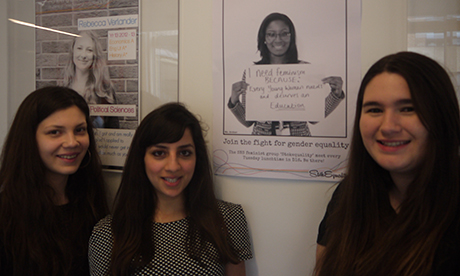Equality time: feminism group StokEquality tackles casual sexism in school

This is what feminists look like: (left to right) Isabella Bremmecks, teacher Noor Hasan and Darcy Dixon
Why do we need feminism? Reasons range from the pragmatic ‘so that my daughters can be financially independent’, to the outraged ‘so we stop asking what rape victims were wearing’, according to life-size photos of staff and students holding placards at Stoke Newington School.
The posters are the work of student feminist campaign group StokEquality, who sell ‘This is What A Feminist Looks Like’ t-shirts to their teachers and are running a petition to ban lads’ mags in Stoke Newington.
Casual sexism in school prompted psychology teacher Noor Hasan to set up StokEquality. “We teach students to not be racist and to not be homophobic, but we don’t teach them to not be sexist. But sexism needs to be addressed early on – older students find it harder to change their views.”
One module in economics A-level covers discrimination in the workplace, but gender equality doesn’t really have a home in the national curriculum. The group is trying to change this. Whole school ‘Creative Days’ off timetable are used to engage younger students in debates on equality, while increasingly students use feminist topics as a starting-point when they learn how to construct arguments in English lessons.
Isabella Bremmeks, 19, is part of the movement. Feminism for her means “fighting for gender equality in the workplace, in the home, in society as a whole.
“We have a long way to go in all those directions,” she says.
Isabella listens to podcasts from Stuff Mom Never Tells You, which tackle everything from female mechanics to Beyoncé. “There are lots of different feminisms now,” says Isabella. “Right now, I’m reading about chicana feminism in Latin America, which responds to a completely different environment, including the dominance of the Catholic Church.”
Isabella values previous ‘waves’ of feminism, but suggests the battle today is different. “We have all the legislation in place now, but discrimination still happens. We have the change, but we need to change people’s attitudes.”
Darcy Dixon, 16, wishes her feminist education had started earlier. “As you become older, the more aware you are that you need these ideas. I realised when I was fourteen that being a girl sometimes made me feel inferior: I felt less able to speak up in class, because if boys are speaking they expect not to be interrupted; and, later, the wolf-whistling starts.”
A third of StokEquality members are boys, but the real task is convincing girls that feminism is more than a life-style choice. “You should look up what feminism is before you say you’re not a feminist,” urges Darcy. “Lots of girls think it’s about not wearing make-up or not shaving your legs – equal pay and getting on in your career are much more attractive somehow.”
